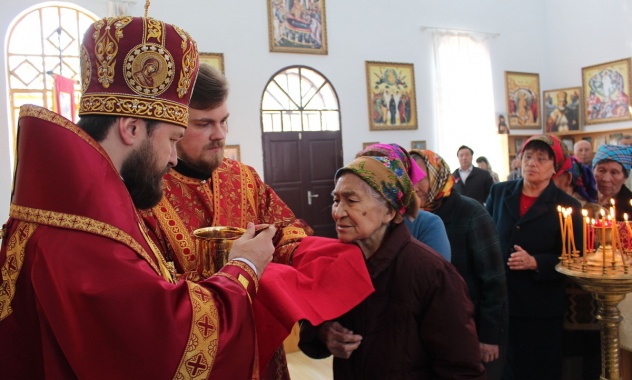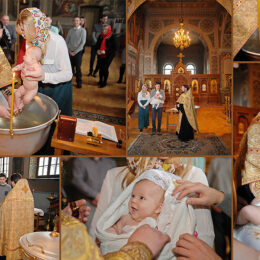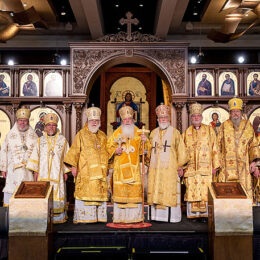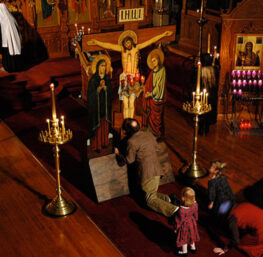 by Fr. Paul Gassios –
by Fr. Paul Gassios –
Many times you have to say to your kids “no, you can’t do that” even if it means your child getting angry at you; they might even say they hate you when you need to enforce an admonition with some type of consequence when they defy it.
In a similar fashion our Orthodox Church teaches certain things that at times are not popular concerning the lifestyles we are to live. There are times we as priests and laity need to say to ourselves and others “no we can’t do that” and if we do; there is a consequence we face if we choose to ignore what the Church teaches. I have already stated when it comes to matters of faith such as the Nicene Creed, that if we don’t accept the tenets of the Creed and outright reject the confession of faith found in it, one should not come to communion until they change their thinking and can say “Amen!” to what the Creed professes to be true.
In the moral area, if someone commits certain sins such as murder or adultery, our Church canons (or rules) call for a certain number of years where one cannot go to communion and must do acts of penance (i.e. actions to show you are sorry for what you did) before someone can be restored to communion.
The Canons of the Council of Ancyra of the 4th century indicate those who commit adultery should do penance for seven years before being restored to communion. St Basil’s Canons call for someone who commits murder to do penance for 20 years before being restored to communion. These are strict from our perspective today, but I just wanted to give you an idea of how these acts were seen in an earlier time in the life of the Church. The consequences for clergy are stricter than the above if they commit acts of murder or adultery.
There are Church canons that address a number of moral lapses in behavior where one should not come to communion until they have appropriately repented for the wrong that was done.
Marital Divorce
In the case of marital divorce, it is understood that if both husband and wife are Orthodox Christians, they are to refrain from coming to communion for a certain time period, and do penance by examining what they did to contribute to the marriage failure. (There are occasions where if the fault of the marriage failure clearly lies with one person, the other person has been allowed to continue receiving communion.) After this penitential work has been done, our bishops in the Orthodox Church allow for someone to be restored to communion, and give permission for a second and possibly a third marriage to take place.
There are Church canons that address a number of moral lapses in behavior where one should not come to communion until they have appropriately repented for the wrong that was done. For example, the penance for the sin of fornication in the 4th century was as short as three years and as along as twelve years (depending on the circumstance) before one was restored to communion.
Secular Society Affecting Christians
However, as society has changed and become more humanistic and secular, it has had an impact on those of us professing to be Christians. Ongoing sexual intercourse outside marriage among men and women and among those of the same sex is not viewed by many as being sinful or wrong. People often live together and are sexually active prior to getting married or they may not even get married at all. There is a big push in states to have marriage redefined to include people of the same sex.
The Orthodox Church has not changed its teaching on any of these above issues.
Here is the problem which I stated almost a year ago in the first newsletter I did. The Orthodox Church has not changed its teaching on any of these above issues. The Church can only bless sexual relations between a man and a woman after they have had their relationship blessed in the sacrament of marriage in the Orthodox Church.
Sexually Active Homosexuals Cannot Receive Communion
Someone who is living a homosexual life style; meaning they are sexually active with someone of the same sex and are not repentant, would not be allowed to receive communion in the Church. The key here is unrepentant; meaning one doesn’t think what he or she is doing is wrong and will continue to act in a manner contrary to what the Church teaches as being right and true. Should someone repent and strive to live a chaste life and remain celibate; they may be restored to communion.
But what about people who profess to be Orthodox Christians and regularly engage in sexual relations with those of the opposite sex and don’t think this is a sin? This is contrary to what the Church teaches. Should someone not come to communion who has this mind set?
Someone who is living a homosexual life style; meaning they are sexually active with someone of the same sex and are not repentant, would not be allowed to receive communion in the Church.
I am asking this question because of how prevalent this unrepentant mind set is today. Furthermore, there are certain ongoing sins the Church seems to tolerate that doesn’t mandate staying away from communion. There are a lot of us who overeat, or smoke several packs of cigarettes a day, or abuse alcohol or drugs. While most of us don’t justify any of the above habits, people who smoke for example are not told to stay away from communion. However we would be expected to confess these as sins when we come to Confession and strive to overcome those passions and impulses in us that contribute to adopting these unhealthy practices.
But coming to the cup is not contingent upon overcoming the above types of sins within a certain time period. I don’t think the case is any different with the sin of fornication (which I am equating with sexual relations outside of marriage). As long as someone is struggling to maintain chastity and to be faithful to what the Church teaches, this might be one of those sins that wouldn’t necessitate staying away from communion for any long period of time (as found in the 4th century canons I cited).
the best medicine for the sin of fornication would be to come to Confession when this sin has been committed before receiving communion again.
Confession
With this in mind, the best medicine for the sin of fornication would be to come to Confession when this sin has been committed before receiving communion again. Participation in the sacrament will eventually strengthen a repentant mindset; help one to struggle with this passion, and to overcome it by the grace and power of the Holy Spirit. The attitude that is expressed to those who are repenting in the sacrament of Confession is that of our Lord’s teaching; we should be prepared to forgive sins not seven times, but “seventy times seven.”
Unrepentant Sin
So what this finally boils down to is when it comes to moral lifestyle and its relationship to communion is that of unrepentant sin. Should someone who is behaving in a manner which is contrary to what the Church teaches, and doesn’t see that behavior as sinful be coming forward to receive communion in the Orthodox Church? My own understanding of the Orthodox Faith tells me that one should not.
HT: St. George Orthodox Cathedral
For this reason I bow my knees to the Father of our Lord Jesus Christ, from whom the whole family in heaven and earth is named, that He would grant you, according to the riches of His glory, to be strengthened with might through His Spirit in the inner man, that Christ may dwell in your hearts through faith; that you, being rooted and grounded in love, may be able to comprehend with all the saints what is the width and length and depth and height— to know the love of Christ which passes knowledge; that you may be filled with all the fullness of God. (Ephesians 3:14-19)
I said last month that I would begin with this quotation from Ephesians because I wasn’t completely at peace with how I approached the topic of our moral lives and its relationship to Holy Communion. This quote from Ephesians and especially the last line expresses something about the mystery of the Christian life that is necessary for us to realize in our life if we are ever going to properly understand the teachings of our Church and why they matter.
For many, the life and the culture of the Church is no longer the main force that shapes our lives.
One of the problems with trying to discuss topics like abortion, sexual sin, or other ethical issues is that we live in a secular, humanistic, culture today that provides very little support for living the type of lives our Church calls upon us to live. For many, the life and the culture of the Church is no longer the main force that shapes our lives. It is this secular, humanistic culture that is now shaping the way many of us think or live.
As priests, we try and present a rational argument quoting scripture, church fathers, or church canons to explain why something is right or wrong. That is what I did in last month’s letter to you. The problem with this approach is two fold. One is that you can easily get into a game of mental gymnastics with someone, quoting scripture, canons, and church fathers. Someone else may counter back with arguments quoting their favorite scriptures, and church sources. Thus we end up arguing seeking to justify our position. We stop listening to what the other has to say. The goal of dialogue on matters of faith is to seek the Truth and remain faithful to the Teaching our Lord Jesus Christ passed onto the Apostles.
The other problem is that if one’s life is no longer being shaped by the culture and life of the Church, it is not going to matter what scriptures or church sources you cite to make your point because you may be talking to someone who has “ears to hear, but can’t hear,” and “eyes to see, but can’t see.”
In a recent sermon I mentioned that when Jesus healed people who were blind, the real healing that took place besides the physical, was a spiritual healing. The blind man in John Chapter 9, and the blind man in Luke Chapter 18, sees Jesus for who he really is, the coming Messiah as prophesized in the Old Testament. These men have spiritual eyesight and worship Jesus as God come in the flesh.
In order to accept and understand Church Teaching on how we are to live our moral lives and why, we first need to know Christ, and find fulfillment in this relationship.
Meanwhile the religious leaders of the time who have knowledge of the Scriptures are spiritually blind and don’t see Jesus as who He really is. Our Church Teaching is that the Truth is not embodied in a philosophy, a moral code, or a law. It is embodied in a person. Jesus tells us in Chapter 14 of the gospel of John, “I Am the Way the Truth, and the Life, no man comes to the Father but by Me.” He tells the leaders of the synagogue in Chapter of 5 of the same gospel, “You search the Scriptures for in them you have eternal life, and it is they that bear witness to Me, yet you refuse to come to me that you may have life.” We need to have healthy spiritual eyesight if we are ever going to comprehend the importance of this Truth! This brings me back to the quote from Ephesians 3:14-19 that I began with.
Paul’s prayer for the church in Ephesus (and for the church in Rossford) is to “be strengthened with might through His Spirit in the inner man,” that “Christ may dwell in our hearts through faith,” and that we may be filled with “all the fullness of God.” He also tells believers in the church at Corinth ‘“who has known the mind of the Lord that he may instruct Him?” But we have the mind of Christ.’ (1 Corinthians 2:16)
In order to accept and understand Church Teaching on how we are to live our moral lives and why, we first need to know Christ, and find fulfillment in this relationship. Unless we “have the mind of Christ” and constantly pray for His fullness to abide in us, no scripture quotations, or canon citations will ever hit the spot in helping us to understand why the Church calls us to live in a certain way.
HT: St. George Orthodox Cathedral




